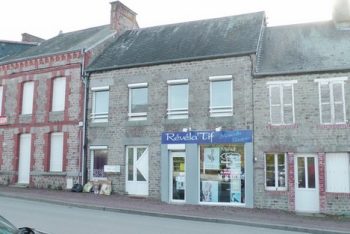Today and like a few weeks ago with Patrice, I leave the floor to another blogger. Paul is the author of the Serial Investisseur blog. He has an approach with some similarities to my initial background and my first steps in rental investment. He offers us today an article on a subject very rarely mentioned on the web, investment in a town house. Having also invested far from the big cities, I can only agree with what is mentioned below… Happy reading!
Any investor worth their salt will tell you emphatically that investing in the countryside is a mistake. A serious mistake. First of all, this in no way respects the famous rule of location supposed to guarantee you mountains and wonders. And then, frankly, who can want to live in a town, far from the hectic life of the cities? No really, that’s a really bad idea.
Yeah…
Except that, as I reminded in this article, you have to think outside the box and above all not to do like everyone else.
I would even go further: if you manage your business well, not only will you not take more risks than by having favored a “number one location”, but in addition, profitability will literally take off!
Over time, I built up a list of criteria allowing me to “screen” the territory. These criteria allow me to know where I put my feet (and my money). Of course, I know my region well, but there are places that surprised me with their dynamism or, conversely, with their gloom.
I’m not going to give you a list à la Prévert, but if you are interested in investing in rural areas, there are some essential points that you must observe:
Often, towns and villages located close to a four-lane spring up like mushrooms. To give a local example, when the A84 motorway linking Normandy to Brittany was opened, this made it possible to open up territories. Since then, there has been a veritable demographic explosion in this sector – and consequently in real estate prices.
Identify areas where businesses are opening, expanding or hiring. Avoid leaning on an area where there is only one economic “locomotive”, however powerful it may be. Better is a host of SMEs in diversified business sectors. Also look at the unemployment rate in the area you are interested in. As such, the INSEE databases (in free access) may seem daunting but oh so instructive.
Point “extremely important” obviously since it conditions your success or your failure as a real estate investor. You have to talk about it with local agencies, notarial offices. And then there is the unavoidable test via a fictitious ad, even before you commit to signing a compromise. This point is sometimes debated. Personally, I took advantage of it insofar as it secures my investment.
Do not forget one thing: in recent years, people have tended to leave the city centers to go to the outskirts or even the countryside. And it’s not so new: I remember the geo teacher in high school who spoke of “rurbanisation”. This does not make us any younger!
To check the demography, nothing could be easier: go to Wikipedia and observe the graphs not only of the municipality but also of the canton. If it’s been a free fall for a decade, you have to seriously ask yourself questions. Personally, I make a cross on these corners.
The big advantage of investing in the countryside, town house or other property is that investors do not roam the streets – or the fields if you want to show a little bad faith.
So that gives you some time to study the area, to think… and to negotiate. Inevitably, when you are almost the only crazy person who wants to buy real estate “in a lost corner”, you find yourself in a strong position in front of the seller who says to himself “shit, it is better that I show a little flexibility with that one because otherwise I’m not ready to sell”.
Come on, I’ll give you an example. Because I still sense a hint of skepticism in you.
In early 2015, we bought a building complex in a town of 650 inhabitants (four shops, a kindergarten and a primary school). The largest city is 15 kilometers away (about 30,000 inhabitants).
If I use the criteria stated above:
Here’s a photo :
As you can see, nothing very sexy: it’s a village house separated into two lots. On one side, the house itself (110 m² of living space) with a courtyard and a terrace at the back. On the other, a small business (hairdressing salon) established here for more than 10 years.
The property had been for sale for several months.
The house is rented for 452 euros to a single mother with three children.
The business is rented for an amount of 228 euros.
The property was displayed at 75,000 euros.
With the notary fees, the bank guarantee and the administrative fees, the gross profitability was already flirting with 10%.
After negotiation, we bought the set for 65,000 euros. With, at the end of the day, a profitability of 11.17%.
Little icing on the cake: the rent of the house is fully and directly paid to us by the CAF.
Second icing on the cake: we were able to contract with the ANAH on old Borloo (see ANIL website). With a profile such as that of the current tenant of the house, this allows us to deduct 60% of property income. If we add loan interest, insurance and property tax, property income is completely erased.
To give you an idea, the rent ceiling not to be exceeded under this agreement is 625 euros. That leaves a bit of leeway…
Note that the old Borloo is particularly interesting when you have large areas. However, supermarkets are more easily accessible in the countryside…
We obtained a 20-year loan covering the entire transaction (except the administration fees = 350 euros). With a rate of 2%, this gives us a monthly payment of 400 euros all round. To be related to the total amount of rents of 680 euros…
Obviously, the effect will be multiplied if you buy a lot of houses. You can literally explode the profitability question scores! But this kind of opportunity is rare.
As in any system, it is necessary to know its limits.
First of all, it remains the campaign. Even if you have ensured a certain dynamism, you will not have 50 candidates to hire. This type of investment will therefore not be suitable for people who want to have a lot of choice.
Then, rental management will be a little more expensive, either in time if you manage it yourself (think of travel time), or in money if you delegate to an agency. But, with profitability beyond 10%, you can afford it.
Finally, with a village house, you will not realize a staggering capital gain the day you sell. Don’t believe in Santa Claus.
But that is not the goal.
And even if you resell, even if you do not make a capital gain, this property will not have cost you a penny since it is the tenants who will have reimbursed the bank!



